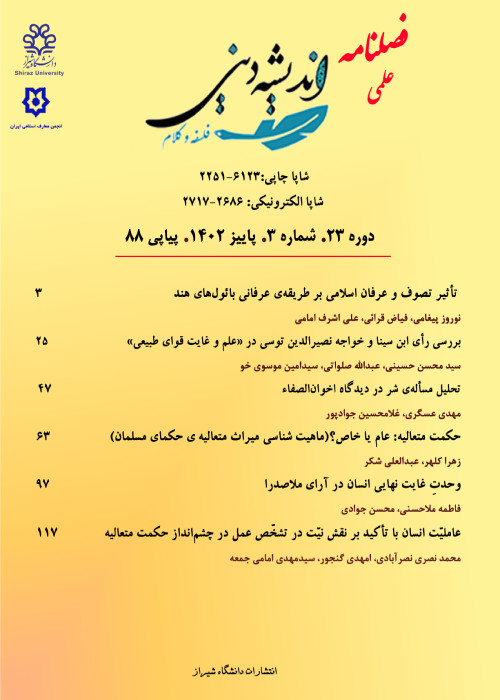Are Synthetic A priori Propositions in Kant's Theory of Knowledge, Really A priori?
Author(s):
Abstract:
Kant is the innovator of "the synthetic a priori proposition" and this has a principal status in his philosophy.Firstly, in this paper, the propositions are divided into "synthetic and analytic", and "a priori and a posteriori; and our purpose is to understand Kant's viewpoint over this issue.Then, the concept of "a priori" will be investigated from Kant's viewpoint. The result of this study is that: the synthetic a priori proposition is the synonym to a proposition which is universal, necessary and not derived from experience.Then, the procedure that Kant adopts for attainment of knowledge, or of synthetic a priori proposition will be discussed.Finally, the question which was posed in the title of the present paper will find the answer that the procedure that Kant presents for attainment of knowledge is unable to produce synthetic a priori propositions, because this procedure has necessarily a part that has been obtained from experience.
Language:
Persian
Published:
Journal of Religious Thought, Volume:6 Issue: 21, 2007
Page:
73
magiran.com/p612947
دانلود و مطالعه متن این مقاله با یکی از روشهای زیر امکان پذیر است:
اشتراک شخصی
با عضویت و پرداخت آنلاین حق اشتراک یکساله به مبلغ 1,390,000ريال میتوانید 70 عنوان مطلب دانلود کنید!
اشتراک سازمانی
به کتابخانه دانشگاه یا محل کار خود پیشنهاد کنید تا اشتراک سازمانی این پایگاه را برای دسترسی نامحدود همه کاربران به متن مطالب تهیه نمایند!
توجه!
- حق عضویت دریافتی صرف حمایت از نشریات عضو و نگهداری، تکمیل و توسعه مگیران میشود.
- پرداخت حق اشتراک و دانلود مقالات اجازه بازنشر آن در سایر رسانههای چاپی و دیجیتال را به کاربر نمیدهد.
In order to view content subscription is required
Personal subscription
Subscribe magiran.com for 70 € euros via PayPal and download 70 articles during a year.
Organization subscription
Please contact us to subscribe your university or library for unlimited access!



